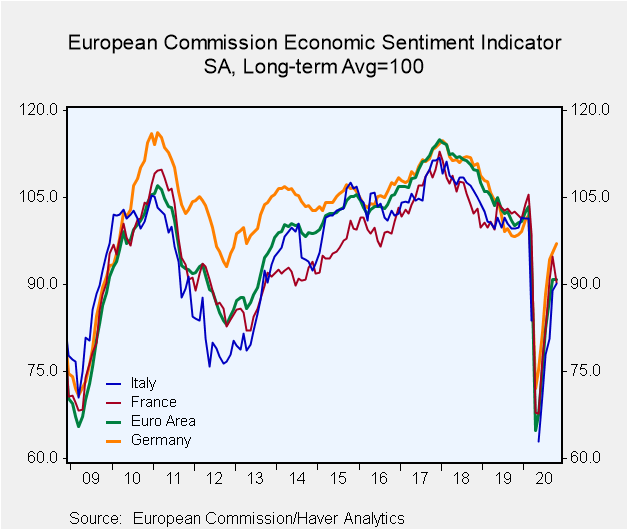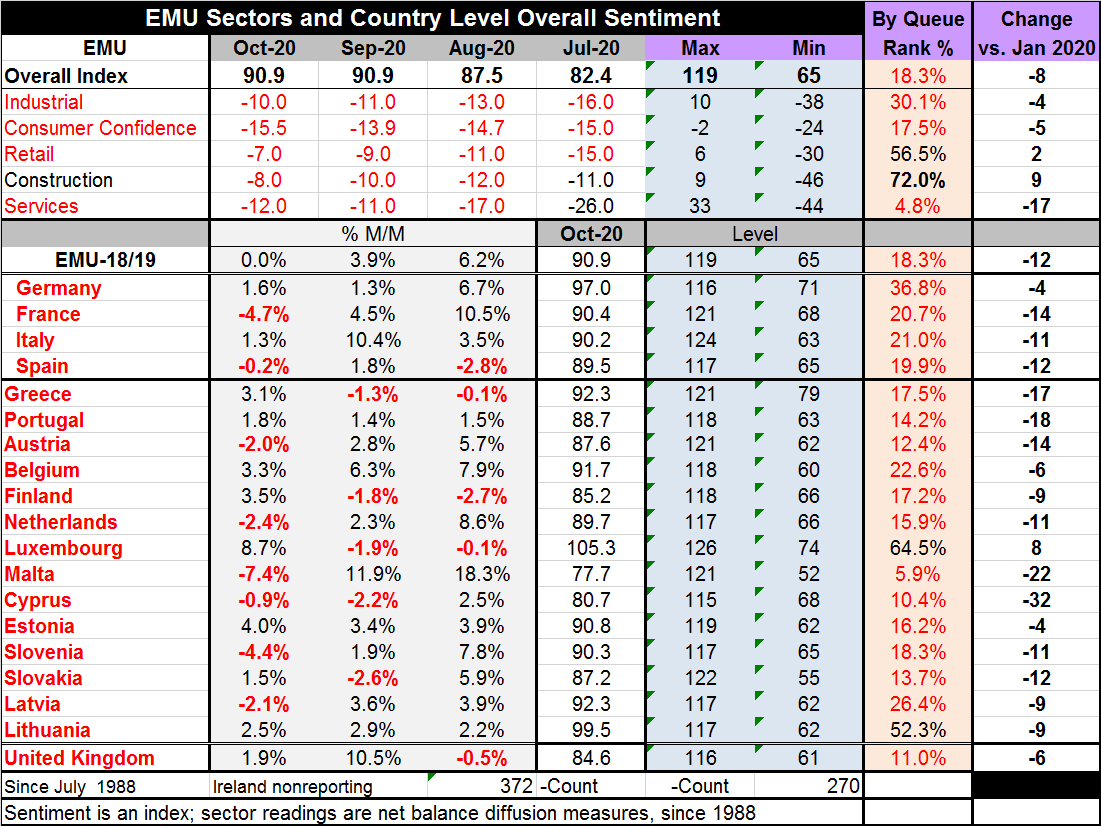 Global| Oct 29 2020
Global| Oct 29 2020EU Indexes Are Unchanged in October
Summary
The EU Commission indexes registered an unchanged reading at 90.9 for the euro area in October. With the virus flaring all across Europe, that result was better than expected. Virus shutdown actions nonetheless proliferate across [...]
 The EU Commission indexes registered an unchanged reading at 90.9 for the euro area in October. With the virus flaring all across Europe, that result was better than expected. Virus shutdown actions nonetheless proliferate across Europe with some economic slowing sure to come. But this index survey does not yet reveal that outcome.
The EU Commission indexes registered an unchanged reading at 90.9 for the euro area in October. With the virus flaring all across Europe, that result was better than expected. Virus shutdown actions nonetheless proliferate across Europe with some economic slowing sure to come. But this index survey does not yet reveal that outcome.
Across the five sector indexes, three improved (industrial, retail, and construction) while two deteriorated (consumer confidence and services).
Among the eighteen early reporting EMU members, eight weakened in October as ten improved. Spain, Greece, Finland, Luxembourg, and Cyprus each have two month-to-month declines in the last three months. Germany, Italy, Portugal, Belgium, Estonia and Lithuania each have three monthly increases in a row.
The table also assesses the net change in the overall sector and country indexes since January to assess the degree of recovery since the coronavirus struck. For all of the EMU, the index is lower by 8 points on this horizon. The services sector is the most affected as it is lower by 17 points since January. However, both construction and retail are net higher on the period. The industrial sector is four points lower and consumer confidence is five points lower. Construction has shown that it has been able to create some distance between itself and the rest of the economy for some time and continue to perform. Meanwhile, the performance of retail simply shows how successful countries have been in maintaining spending power for consumers except in the services sector where social distancing issues continue to pound the sector despite the fact that consumers have the wherewithal to spend more.
By country, only Luxembourg, a tiny country that is a financial center, is better off overall than it was in January. Apart from that, the least impacted countries are Germany (-4), Estonia (-4), Belgium (-6), The United Kingdom – not an EU country (-6), and then Finland, Latvia and Lithuania all at a -9 reading.
At the other end of the spectrum, among the most struggling countries, we find tow small Mediterranean island economies Cyprus (-32) and Malta (-22) lead the pack, followed by Portugal at (-18), Greece at (-17), and at -14 both Austria and France.

The table below shows sector detail by country for the four largest EMU economies plus the U.K. On this grid, it is clear that the construction sector has been the least-affected sector overall with three countries showing sector activity above its median pace. However, no other sector in any country is above its median pace (a 50% ranking). Germany has an overall sentiment ranking in its 36th percentile which is low, but it is the highest of the group. The U.K. index ranks it only in its 11th percentile standing. The services sector is the most clearly and significantly adversely affected with exceptionally low rankings everywhere but in Italy. Interestingly Italy has been seeing a lot of push back from people fighting any new round of lockdowns or travel restrictions.

On balance, the virus remains a huge problem as much of Europe is being impacted with new rules meant to stop the spread. It is surprising that this month the EU overall index managed to remain unchanged. At this point, the outlook for next month has to be extremely guarded.
Robert Brusca
AuthorMore in Author Profile »Robert A. Brusca is Chief Economist of Fact and Opinion Economics, a consulting firm he founded in Manhattan. He has been an economist on Wall Street for over 25 years. He has visited central banking and large institutional clients in over 30 countries in his career as an economist. Mr. Brusca was a Divisional Research Chief at the Federal Reserve Bank of NY (Chief of the International Financial markets Division), a Fed Watcher at Irving Trust and Chief Economist at Nikko Securities International. He is widely quoted and appears in various media. Mr. Brusca holds an MA and Ph.D. in economics from Michigan State University and a BA in Economics from the University of Michigan. His research pursues his strong interests in non aligned policy economics as well as international economics. FAO Economics’ research targets investors to assist them in making better investment decisions in stocks, bonds and in a variety of international assets. The company does not manage money and has no conflicts in giving economic advice.






